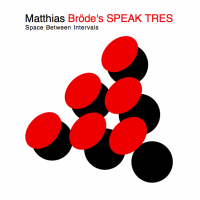
LINER NOTES by Karsten Mützelfeldt (Jazz Journalist, Germany, WDR, Deutschlandfunk, Jazz Thing) for the new CD “Space Between Intervals" recorded by Matthias Broede's SPEAK TRES:
It's a matter of fact that in the history of Jazz the harmonica plays a role as small as its size and had to share its place in the polls with other “miscellaneous instruments". These reasons make it inevitable to write some introductive words. Even though Toots Thielemans isn't anymore the only name who comes to one's mind at this issue, the harmonica receives little attention in Jazz compared with more common instruments.
This doesn't mean automatically disinterest, it can even bring forth the opposite: From the exotic status may result that e.g. journalists cut down the musician on his instrument, they exploit him. The first questions almost exclusively focus on the instrument. So the music itself may have taken a back seat, group sound and composition will be considered much later than e.g. with a piano trio.The fact that in Jazz the combination of harmonica, bass & drums is literally unprecedented brings the instrument in an even more exceptional position. SPEAK TRES are quite quick on abolishing this selective hearing and on bringing the focal point on the music itself. This alone is an achievement which cannot be overestimated. In terms of the band name three musicians are talking to each other in a non-verbal way continually giving and taking, which is based on perhaps the greatest virtue in collective music making: listening to each other.
That sometimes less may be more - this is said many times too hastily. To create space and to leave it, to configure without filling, this is a skill which not many are able to accomplish. The scandinavians are especially great in this, they have an awareness of sound which doesn't need many musical words. This may result from the width of the landscape or even from the fact that some people from the north are considered as word-sparing. The last one is something which doesn't come to one's mind speaking about southerners - yet here a Catalan, an Italian and a German living in the south demonstrate a culture of musical conversation that incorporates the listener into the music. It's not a skin-deep smalltalk, not an interchange of phrases and cliches, it's a conversation with meaning and depth but without - and this also displays another quality of SPEAK TRES - heaviness and rhetorical stops which may indicate: “Listen how great this is!"
All this may be said also about the “second trio" of the album. If the lineup with harmonica, bass & drums has its scarcity value, the instrumentation piano, bass & drums is quite the opposite, one of the most common ones in Jazz, almost a genre per se with an own tradition and models of reference usually not to be avoided. Here the leveling board and the concentration of quality are especially high, so that it is extremely difficult to become heard in the jungle of piano trios. The band name SPEAK TRES says already something about the culture of playing whilst the title of their debut CD Space Between Intervals affords more information than one might expect in the first moment. Every skip between intervals bridges a space between tone pitches. In this case space also stands for the compositions in between the various Interval Series: shorter and more song-like tunes. The three parts of the Interval Series are not exactly a suite but they have in common the main principles of composition and constitution. They are based on certain intervals in the composition as well as in the improvisation, beginning with motives of a few notes which sometimes only establish the tempo and the atmosphere like musical sketches. Space also stands for this kind of economy as well as for the whole trio concept - each musician leaving space to the others and to the fantasy of the listener.
In the beginning of Interval Series Part 1 Bröde uses the diatonic harmonica - an instrument which is more common in Blues than in Jazz, however for the rest of the album he plays the chromatic one. In the last third of Interval Series Part 2 he switches to the piano, playing for quite a time only single note lines before incorporating some chords near the end without defining concrete “changes", this way also demonstrating the “open concept" of the trio. Bagatelle No.3 represents the type of the more basic, song-like tune with odd meters of 6 & 5, and so does Der Siebener, which lets the 7/4 flow so easily that you don't even notice that's an odd meter. The album closes with Frei Ayran Für Alle, recorded live at the Jazzschmiede, a well known venue in Düsseldorf, Germany. Playing a live concert is totally another situation than playing in a studio, but comparing this track with the former ones gives evidence that SPEAK TRES are cultivating the live character of their music also in the studio. A “topic of conversation" may be defined in advance but not the development of it. So let's follow the “trialogue" and do what these musicians exemplify to us so impressively: The virtue to listen to each other.



























